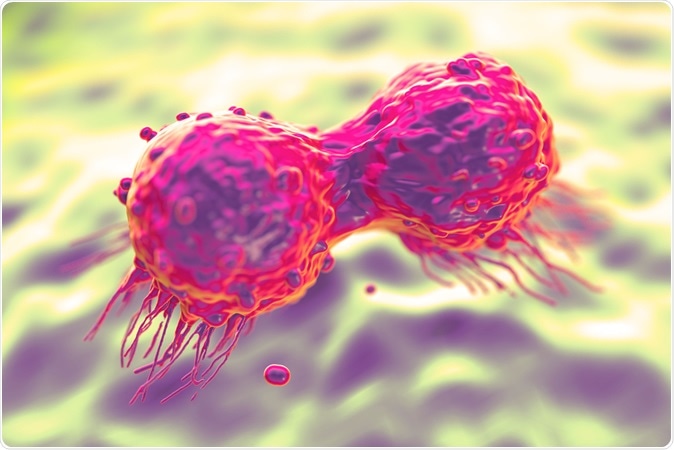A new large scale study has focussed on faulty BRCA genes and their linkage to breast and ovarian cancer. The research could help doctors counsel and advise their patients in a more definitive way in terms of treatment as well as lifestyle changes that could minimize cancer risk.
BRCA1 and BRCA2 are two known genes whose combination of genetic faults along with environmental factors can raise the risk of getting a cancer in a woman. Faults in these two genes have been particularly known to raise the risk many fold. The accurate estimates of getting breast and ovarian cancers among women with these two genetic mutations changes with age and is thus often difficult. If these estimates could be made, preventive strategies such as changing lifestyle behaviors, taking certain medications or undergoing certain surgeries could be advised. Screening for cancers can also be better streamlined if the risks are better defined.

Dividing breast cancer cell - Image Credit: royaltystockphoto.com / Shutterstock
Most studies on cancer risks for BRCA1 and BRCA2 mutations are “backwards” i.e. they are looking at the mutations among women who have already developed the cancers. Thus accurate understanding was lacking. To overcome this, the new study has looked at a large number of healthy women who have not yet developed breast cancer, if they have the mutations and has followed them up over time. This study is published in JAMA: The Journal of the American Medical Association, conducted by an international team of researchers led by the University of Cambridge, UK.
Study’s author, Dr Antonis Antoniou from the Department of Public Health and Primary Care at the University of Cambridge said that this study could provide “most precise estimates of age-specific risks to date”. This would be very helpful in counseling the women with faults in the BRCA1 and BRCA2 genes as well as in their treatment.
The study recruited a group of 9856 women with the mutations. There were 6036 BRCA1 and 3820 BRCA2 female carriers. Of these, 5046 were unaffected by any cancer and 4810 had with breast or ovarian cancer or both at baseline or starting of the study. The study recruitment began in 1997-2011 through three major databases - International BRCA1/2 Carrier Cohort Study, the Breast Cancer Family Registry and the Kathleen Cuningham Foundation Consortium for Research into Familial Breast Cancer. The women recruited were part of other large studies in United Kingdom (EMBRACE), the Netherlands (HEBON), and France (GENEPSO). The participants were studied until December 2013 with an average of 5 years of follow up for each woman.
Within the 2,276 of the women with BRCA1 mutations and 1,610 BRCA2 mutation carriers, the researchers found 426 new breast cancer cases. Among those with BRCA1 mutations, breast cancer cases rose between ages 30 and 40 years. From the 2,905 women with BRCA1 mutations and 2,161 women with BRCA2 mutations, there were 109 new ovarian cancer cases.
Researchers estimated risks at:
- Breast cancer risk up to 80 years of age was 72% for BRCA1 mutation carriers
- Breast cancer risk up to 80 years of age was 69% for BRCA2 carriers
- Opposite breast cancer risk 40% for BRCA1 mutation carriers
- Opposite breast cancer risk 26% for BRCA2 carriers
- Ovarian cancer risk up to 80 years is 44% for BRCA1 mutation carriers
- Ovarian cancer risk up to 80 years is 17% for BRCA2 mutation carriers
The position of the gene fault and the history of cancers in the family altered the cancer risk say researchers. Mutations in genes occur if the codons in the DNA called A, C, G and T get changed to a different one. There are millions of such “letters. A small change thus could mean a many fold increase in risk.
Nowadays there have been advances in screening technologies and thus all women could be screened for BRCA1 and BRCA2 mutations rather than only those women who have a first degree female relative who has these cancers. Earlier the estimates were not quantified. This study has provided the required numbers that could help doctors counsel their patients regarding screening.
The study was funded and supported by Cancer Research UK, the European Union and other funders.